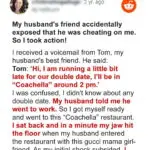“You got three of them. Too many.” Then he shut the door.
I walked home fuming.
But later that evening, my oldest, Bram, knocked on my bedroom door and said, “Mom, I think Mr. Rowley’s sick.”
That was the first time I realized—I didn’t even know his name. Mr.
Rowley.
“He’s been out front coughing for like ten minutes,” Bram said. “Just standing there with a towel on his shoulder.”
I peeked through the blinds. He was standing on the porch with what looked like a soiled towel, leaning over the railing, coughing so hard I thought he might fall over.
I told the boys to stay inside, grabbed a mask, and walked over.
“You okay?” I called from the sidewalk.
He didn’t answer right away.
Then he muttered, “Not really.”
I ended up calling an ambulance. Turned out, Mr. Rowley had pneumonia.
He lived alone, no family nearby. Apparently, his daughter used to live three hours away but hadn’t spoken to him in years. He hadn’t been to the doctor in months and had just… given up.
That towel on his shoulder? He’d been trying to hide how often he coughed up blood.
When he got discharged four days later, he had a note taped to his door: “Thanks for calling the ambulance. I’m sorry about the bins.”
The next few months changed everything.
My boys started taking his trash out for him every week. They’d bring his newspaper to the porch and leave him homemade soup in mason jars. I started talking to him more too.
He wasn’t a bad guy. Just lonely. Angry.
And grieving, though he never said it outright.
Apparently, he lost his wife five years ago. She used to love feeding the stray cats around the neighborhood, and he still leaves food out even now. The sidewalk thing?
She used to walk with a cane, and he’d yell at people who blocked the path, even after she passed. Some habits don’t leave a person easy.
By spring, we were waving at each other like old friends. When I hosted a small Easter barbecue for the boys and some neighbors, Mr.
Rowley showed up with a six-pack of root beer and a homemade carrot cake. Everyone was stunned.
One of the new neighbors asked how we became friends, and Mr. Rowley just chuckled and said, “She taught me about banana bread, and I guess I owed her a few hundred trash bags.”
Here’s the thing: people don’t always act out because they’re bad.
Sometimes, they’re just hurting in ways we can’t see. I could’ve fought back with more fines or passive-aggressive notes, but a little kindness cracked something open that anger never could.
Don’t get me wrong—boundaries matter. But grace?
It goes a long way.
If you’ve got someone difficult in your life, maybe there’s a story behind their behavior. Doesn’t mean you excuse it—but maybe try understanding it.
You never know whose life you might change just by showing up.
❤️ If this story made you smile, like it and share it with someone who needs a reminder: kindness still matters.







